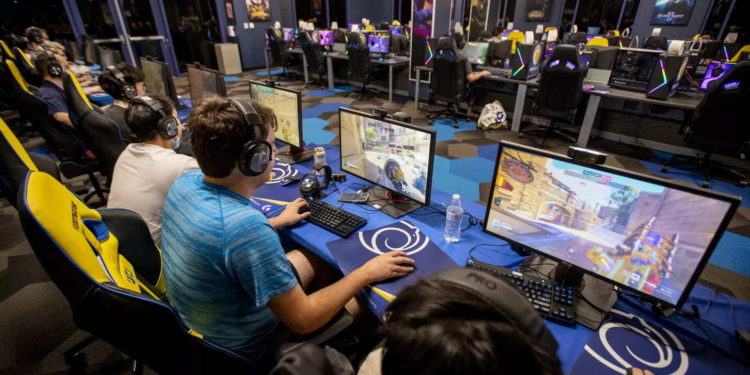Electronic sports or eSports is a world where video game players achieve legendary achievements and virtual contests.
In eSports, gamers compete in video games as opposed to playing on a field, as in professional sports. Teams and players in eSports compete against one another in games like League of Legends or Fortnite to see who is the greatest; just way teams do in sports like soccer or basketball.
Like a major game on television, people watch them play online. Like conventional athletes, the top players can build up wealth, fame, and fans. It’s like a really awesome mash-up of sports and games!
The world of electronic sports connection is a significant name in the video game industry that may beat well-known sports leagues in popularity.
With things like acquiring sponsors, selling commercials, tickets, and licensing, along with creating exciting products to sell, esports centers have the potential to grow and improve like a young sector.
People agree or not, Video gaming is interesting and a passion for millions of people out there who truly invest their time and energies in this industry.
Esports fans like watching professional video gamers compete against one another in online spaces; just as fans enjoy watching elite athletes succeed in the sports world.
Therefore, let us all understand the digital world of sports and gaming!
What Is Electronic Sport or eSports?

eSports, managed by professionals in competitive video games involves experts or teams playing against one another in various video games, often in front of a live audience or online viewers. eSports has grown significantly in popularity and has established itself as a real industry with a sizable fan base, rich sponsorships, and even its own leagues and competitions.
Yes, this is true and this happens in the real world.
If a phenomenon is taking the attention of millions worldwide, then certainly people want to engage with it. It is not just a passing interest, nor is it your normal gaming night with friends.
- eSports or electronic sports is a digital world where players become renowned athletes and computer games develop into exciting competitions.
- If we talk in simple terms, imagine a society where fans come together in online spaces rather than stadiums sports world to watch teams compete in Counter-Strike, Dota 2, and League of Legends.
- Players in eSports compete at a professional level, just like those of basketball or soccer, investing hours in improving their abilities, strategies, and teamwork.
- Moreover, the revenue potential of electronic sports is also massive. We can’t say that it is in direct equality with traditional sports, but it has great potential to be in tremendous limelight. The numerous revenue streams that eSports is already starting to hit serve as the foundation for this ambitious prediction.
- One such possible growth area is in the area of ticket sales. Fans might purchase tickets to go to live esports center competitions in the same way that they do for live football events.
- Although the word licensing may sound upmarket, it simply refers to granting permission for a charge for others to use a game’s name, logos, or characters.
- Like professional sports world leagues, eSports has also the high possibility to provide a wide selection of fun items, from t-shirts to mouse pads, that supporters can proudly use and wear.
- Another important point is that traditional sports connections normally have sponsorships, and these sponsorships have already started to flood the eSports market.
- Brands are aware of the opportunity these sponsorships present to engage with a sizable and enthusiastic audience. In this manner, if the popularity of eSports would further rise as it is developing well already, it will attract more sponsors and support the expansion and financial stability of electronic sports.
- Selling eSports-related products is a significant business possibility. Just as sports supporters heartily put on the jerseys of their favorite teams, picture fans supporting their favorite electronic sports team.
Nonetheless, the enormous development of eSports is not just wishful thinking; rather, it is based on the reality of this emerging sector.
Important Elements In eSports/Electronic Sport

eSports has a lot of important parts and elements that complement the sector.
Let’s break it all.
- Games: eSports includes many different types of video games, including first-person shooters (like Counter-Strike: Global Offensive and Overwatch), MOBAs (like League of Legends and Dota 2), real-time strategy games (like StarCraft II), fighting games (like Street Fighter and Super Smash Bros.), and sports simulating games (like FIFA and NBA 2K).
- Players and Teams: Professional players who specialize in particular games are part of eSports, much like in traditional sports zones. These athletes participate in teams or alone.
- Viewership: Dedicated esports center, as well as services like Twitch and YouTube Gaming, frequently stream esports tournaments. Each game can have a lively audience made up of both in-person viewers and internet viewers.
- Leagues and Organizations: Numerous leagues and organizations have been created to organize and control the competitive scene. For instance, some of the well-known leagues include the Overwatch League, the League of Legends Championship Series (LCS), and the Dota 2 Pro Circuit.
- Investments and sponsorships: Major sponsorships and investments have been made in electronic sports by companies across a range of sectors, including technology, entertainment, and sports. Major sponsors support teams, occasions, and athletes, which helps the industry, develop.
- Training and Skill Development: To compete at a high level in electronic sports, players must put in a lot of practice and enhance their skills. Numerous professional athletes engage in intensive training routines that include teamwork, mechanics, and strategy practice.
- Professional options: Along with player positions, the esports center has created new professional options for shout casters (commentators), analysts, coaches, content producers, and event organizers.
- Advertising: Companies like Intel, Samsung, and Coca-Cola use live streams and other content to advertise to electronic sports viewers.
- Sponsorship: Teams and players are sponsored by brands, both native (gaming/tech) and non-native, which contributes significantly to revenue.
- Publisher fees for games: Publishers invest in marketing to increase the relevance of games, but this growth is slower than that of other revenue streams.
Statistics Related to Esports

- 2023 will see 532.1 million viewers of electronic sports worldwide.
- The market value for electronic sports is expected to be $1.44 billion in 2023 and $5.48 billion in 2029.
- E-sports revenue is highest in China.
- The prize fund for Dota 2 is $47.79 million.
- On Twitch, there are 7.63 million live streamers.
- The average age of more than 60% of supporters is 26.
- In 2023, there will be more than 2 billion esports fans, up from 800,000 in 2015.
- The growth of video games and e-sports is predicted to be 6% between 2020 and 2025.
- The two largest markets are Asia and North America.
- Sponsorships bring in the most money (8737.3 million), followed by Media Rights (207.8 million), Publisher Fees (130.7 million), Merchandise and tickets (107.9 million), Digital (53.9 million), and Streaming (46.3 million).
- Activision Blizzard currently controls 21.85% of the esports center and market.
- The audience for electronic sports worldwide was 540 million in 2023 and is expected to reach 640.8 million by 2025.
- 28% of the audience is female, and 72% are men.
- During the COVID-19 pandemic, interest grew, especially among younger age groups.
- 65% of users are male, 35% are female, with a user demographic of 41% 16–24, and 32% 25–34.
- The most-watched game is League of Legends, with Ninja as the most popular channel.
- Team Liquid is in first place in terms of total winnings.
- Scarlett is the highest-paid female player with earnings of $423,94K.
Is Esports Financially Viable?

Numerous financial prospects are possible in esports centers and industries.
Publicly traded businesses are heavily involved in the sector, including Tencent and Activision Blizzard. Considering the industry’s explosive expansion, it can be profitable to invest in esports-related businesses and companies.
The electronic sports industry is more than just a playground for gamers; it’s an environment ready with business opportunities.
Both experienced players and newbies are looking at the exciting opportunities that investments in esports have to offer as the sector continues its stratospheric development.
You don’t have to be a pro gamer or an insider of a gaming firm to invest in an esports center. The sector includes a wide range of investment opportunities that can accommodate various risk appetites and investment objectives.
Electronic sport is heavily supported by some of the biggest names in gaming and technology. Activision Blizzard and Tencent, for example, have sizable stakes in the sector. For instance, Riot Games, the company behind the hugely popular game League of Legends, is owned by Tencent. On the other side, Call of Duty and Overwatch were made popular by Activision Blizzard.
Exposure to the esports center and industry can be gained by investing in the stocks of these listed businesses. These businesses profit from the expansion of the sector, and if esports acquire popularity among the general public, the value of their shares increases.
Electronic sport is not just about the biggest gaming companies; it is also a port for new businesses and creative projects. Numerous startups are forming to serve various areas of the ecosystem as the sector grows.
The esports center and industry is one where venture capital firms are constantly looking for chances. If startups that solve unusual problems or present innovative solutions are successful in meeting market demands, investing in them can result in large profits.
Professional esports teams and organizations are attracting more and more money from investors in the sports world.
Teams represent not only talented athletes but also strong brands with passionate followings. Successful esports teams can generate income from sponsorships, merchandise sales, and a cut of prize money.
The technology that supports electronic sports, including streaming services and communication tools, is essential to the development of the sector.
These companies that offer these fundamental services can make wise investment choices. Companies that specialize in esports technology may find themselves at the forefront of the industry’s transformation as the desire for smooth streaming experiences and increased participation develops.
Moreover, Esports also provides viewers with entertainment value. Broadcasting and media rights are getting more and more profitable. Platforms that obtain exclusive content deals and electronic sports event broadcasting rights can make money.
Fans of esports are incredibly engaged, spending a lot of time watching matches and cheering for their favorite teams.
Platforms that encourage fan contact, community development, and fan engagement have a lot of potential. By investing in these platforms, businesses can capitalize on the devoted and passionate electronic sports fan base.
Early investments in the appropriate businesses can generate remarkable profits as the industry continues to grow and gain widespread awareness.
There are risks associated with investments, though. The esports center and industry are cutthroat and ever-changing. Market swings can have an impact on stock values, and not all startups or teams will flourish.
Well, every sector has its pros and cons. You have to be wise and attentive with great plans that go with esports.
How Gaming Has Evolved From a Pastime to a Profitable Industry?

Well, this is an interesting question because a lot of times such different things are not easily understandable.
Gaming has evolved from a particular hobby to a well-known activity in the sports world. The entertainment industry has evolved into a massive enterprise that generates more money than the combined profits of the music and film industries. Competitive gaming, often known as esports, has become a new star in the gaming sports connection.
Electronic sport has an alluring characteristic that cuts beyond age, gender, racial, and cultural divides. This is a passion that people all over the world share; it is not a specific hobby but a big sports zone.
It is true that Gaming was once restricted to the leisure and entertainment industries, but now it has undergone a significant transition that has thrust it to the forefront of international commerce.
This path has been accelerated by the quick development of technology, from simple cheer-up to fully immersive virtual reality experiences. This evolution has produced a gaming landscape that is suitable for creative gameplay and various gaming experiences that appeal to audiences well beyond the typical gaming demographic.
Therefore, the emergence of electronic sports is one of the most striking characteristics of gaming evolution.
The financial strength of gaming highlights its development from a pastime to a major sports connection industry. Microtransactions, in-game purchases, and subscription models have replaced the sale of game copies as reliable revenue sources for game producers.
The expansion of gaming has boosted the economy and created jobs, also. The ecosystem that raises employment and entrepreneurial prospects includes game development companies, esports leagues, streaming services, and content producers.
Beyond gaming, innovation has sparked technological developments due to the demand for improved player experiences.
How Will Advancements in Technology Influence The Electronic Sports Industry?

The technological advancements have certainly influenced the esports center just the way it did in several other sectors.
- Technological developments can give viewers more engaging and immersive experiences with the help of virtual reality (VR) and augmented reality (AR) technologies.
- The viewing experience will be more pleasurable and visually appealing due to higher-resolution displays, sharper graphics, and improved streaming technology.
- Real-time data and analytics during games can be provided via technology, increasing audience engagement by providing information on player performance, strategy, and game statistics.
- Due to the abundance of streaming services, viewers have a variety of options for where and how to watch electronic sports competitions.
- AI-driven technology makes it possible for smart broadcasting, which automatically focuses on crucial moments, player reactions, and exciting plays to improve the storytelling element of the electronic sports.
- As seen during the COVID-19 pandemic, online viewers and fan responses can be incorporated into the broadcast, raising a sense of community even in situations where physical attendance is constrained.
- Holographic displays are a futuristic technology that may change how spectators view esports centers and competitions by projecting 3D images that give the impression that the action is taking place directly in front of them.
- As technology advances, game designers may create new formats, mechanisms, and difficulties that further engage audiences and offer new experiences for both players and spectators.
The Ending Notes
Nonetheless, this is all the important points related to this flourishing industry.
Electronic sport is a perfect example of entertainment and passion united with technology and business.
Esports has the ability to compete with conventional sports in a number of areas like Viewership and Participation, Audience, Industry Development and Income, and Global appeal.
Esports championships are expected to outperform major sporting events in terms of popularity. The statistics shown above are the answer to the interest people are showing in it.
Well, the future and time will give the answers to a lot of questions relating to this sports zone.
But, the way technology is changing the way we used to do a lot of things usually, can bring up better for electronic sports.
So, what do you think? Will esports continue to draw more spectators and participants than traditional sports? If so, do you think it will someday stand parallel to the traditional sports industry?
What do you think about electronic sports as the next big industry?













